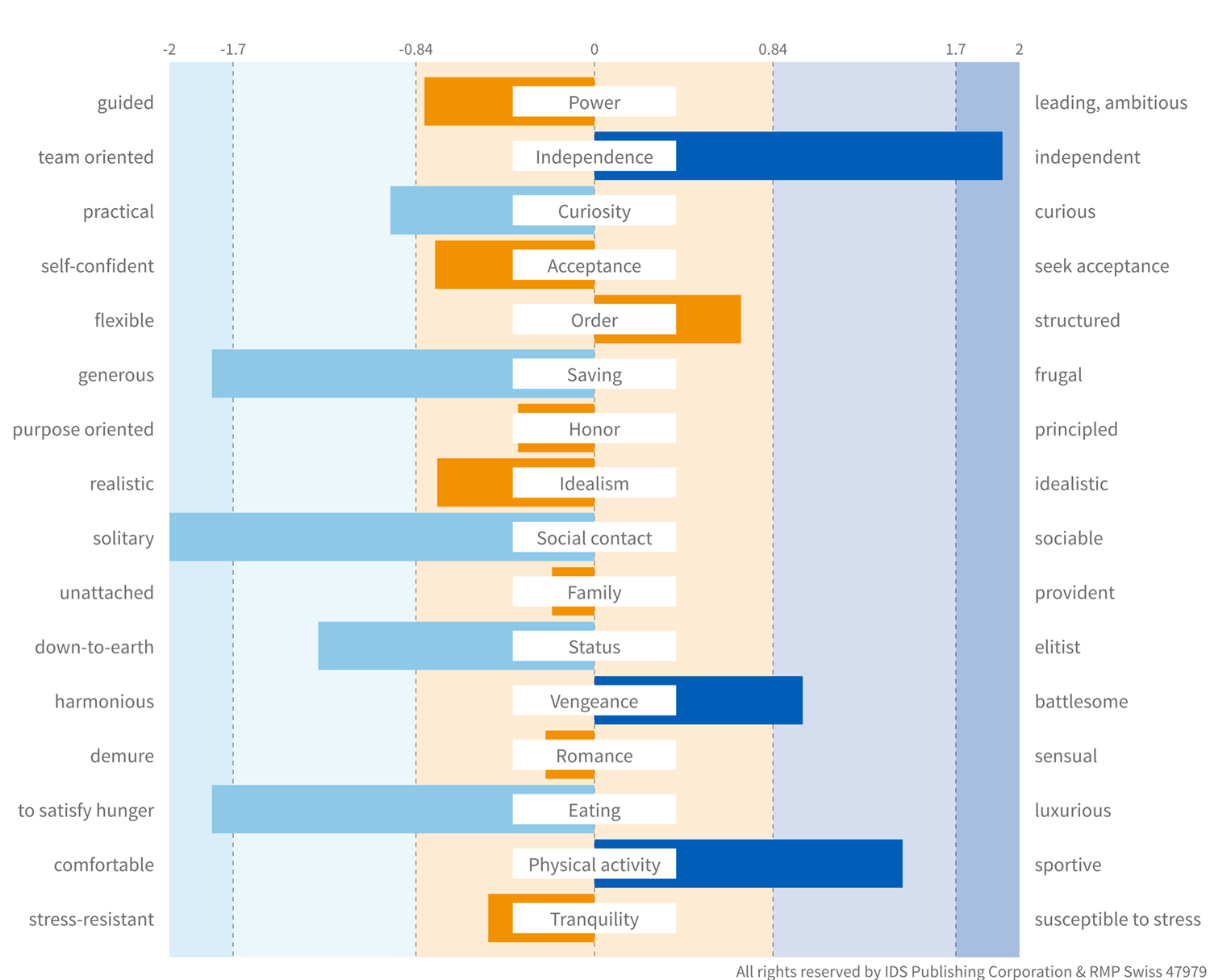
Principles
Reiss Motivation Profile - how did it start?
For Steven Reiss, there was a mystery in life that he wanted to solve: Why are people the way they are and how do I understand AND predict their behaviour?
Using these two questions, he developed the Reiss Motivation Profile, a tool that reveals a person’s fundamental goals and values. The personality profile that was created through this has so far helped countless people to understand themselves and other people better. He reduced the main psychological motivators down to 16 basic desires. Assessing each of these 16 motivators in life helps you to create a picture of your intrinsic behavioural motivators, i.e. the things within you that drive you.
This means that every person who receives their results of the Reiss Motivation Profile can see why they consider certain actions to be reasonable; by combining their own, personal, individual motivators in life, they can understand and see the reasons behind their behaviour.
Research
Who am I? What do I actually want?

Until now, psychologists have worked on the basis of only a few different, yet dominant, impulses that determine people's actions; Steven Reiss’ empirical research, on the other hand, identified a significant number of factors.
Sigmund Freud believed that libido was almost the only driving force. Alfred Adler believed that people want to belong and become better / grow / learn / be significant / respected and muster the courage to compensate for their flaws. The American psychologist Abraham Maslow considered the striving for self-actualisation to be the driver for human behaviour.
“These schemata do not take any account of how different people are,” says Reiss. There was no system that included human diversity when it came to looking at the motivators for behaviour.
What makes people tick is so varied that it cannot be explained by just a few impulses
In a series of nine, large trials that included over 8000 men and women, Reiss looked into the psychological ‘essential motivators’, which he later called ‘basic desires’, that ultimately drive people.
The basic desires that Steven Reiss identified are the result of this comprehensive scientific research. “For the first time in scientific studies, we looked at the question of what motivates individual people,” says Reiss. The result is a breakthrough in motivation research, as it enables you to describe precisely what drives people, i.e. their individual needs and motivations behind their actions. “The intensity of individual desires varies widely from person to person,” explains the psychologist. “This is what constitutes a personality.” Every person has their own, almost unique set of basic desires. Having your individual needs fulfilled makes you happy and content.
What's behind it all?
Scientifically founded by means of factor analysis (meanwhile tens of thousands of profiles from many countries around the world have been evaluated) 16 different motives for life can be distinguished using the Reiss Motivation Profile®: Acceptance, romance, curiosity, eating, family, honor, idealism, independence, order, physical activity, power, saving, social contact, status, tranquillity, vengeance.
The 16 motives for life differ from the many lists of basic motives and intentions in psychology because they are based on a broad empirical basis and the investigation of thousands of people. Many other approaches are based almost without exception on pure introspection as with Plato, observations of animal behavior - as with James and McDougall - or theoretical in-depth psychological approaches - as with Murray.
The 16 Basic Desires
- were determined strictly empirically,
- are based on factor-analytical evaluations,
- and have been confirmed in numerous follow-up studies across cultures.
Steven Reiss assumes that at least 14 of the identified motives have a genetic determination. Our motives thus have an evolutionary origin, but are shaped by culture, our beliefs and our individual experiences. What we wish for is largely determined by our genes, but how we fulfill our desires is mainly determined by our culture and our experiences.
These 16 life motives are independent dimensions ("factors"), which have a high explanatory value in relation to human behavior and also have a high predictability of behavior. Every human being has a motivational fingerprint - just like everyone else has his or her genetic fingerprint. The different motivators are combined and more or less pronounced in each person in their own way. Thus, the individuality of man is taken into account and not attempted to classify people in typologies.
- The motives determine our behavior per se: to live them out is their purpose.
- The motive profile of a person is basically stable.
- We find a distinction between feel good-happiness and value-based happiness. By well-being happiness, Steven Reiss understands a person's efforts to create a good feeling as quickly as possible and to find meaning in it. In contrast to this there is value-oriented happiness, which means to have found the meaning of one's own actions and to orientate one's life towards one's own values and motives.
Last but not least, we understand the Reiss Motivation Profile® as a plea for tolerance: Steven Reiss advocates understanding and accepting the motives of other people. Because we tend to consider our own values as desirable and to underestimate those of others.
On request, we will be happy to provide you with the quality criteria for the individual motives of life.
Network
|
Renormalization process 2017
What are standards/norms? In order to be able to say something about the test values of a single person, the values of this person are compared and related to a norm sample that is as large and representative as possible. This makes it possible to interpret individual test results. Reiss Motivation Profile® standards In the original sample from 2001,1,749 test participants were recorded. In 2007, the Reiss Motivation Profile® was standardized based on a sample of approx. 7,800 test participants. In 2012, 45,000 test persons have already been registered in a renormalization process. Since September 2017, the new standards have been in place, covering a period from 2007 to 2017. The standard sample of the Reiss Motivation Profile® now comprises 79,888 test persons from 23 countries and 3 continents (America, Asia, Europe). This process was conducted by William Aflleje of Reesh LLC in collaboration with Mike Reiss and Maggi Reiss of IDS Publishing.

The Reiss Motivation Profile®
What Motivates You?
What determines your life? What is really important to you?
What makes you successful? What makes you happy?
As US psychologist Steven Reiss found out after many years of research with thousands of test subjects, not only one or two basic desires determine our existence, but 16 vital needs and values - our basic desires. Thereby, every person has – like an individual fingerprint – a distinctive “basic desire profile”.

New
Workbook – The Reiss Motivation Profile®
This book is directed at all those who work professionally with the Reiss Motivation Profile® or want to be trained as Reiss Motivation Profile Master®. Accordingly, it provides a comprehensive insight into the theory of the 16 life motives as well as the empirical statistical background for the test construction of the Reiss Motivation Profile®. (The manual is in German language)
His Reiss Motivation Profile®
Steven Reiss
Born in New York in 1947, Steven Reiss was Emeritus Professor for Psychology and Psychiatry at Ohio State University (USA) and Director of the Nisonger Center for Mental Retardation. He is the author of numerous research papers and specialist books and has received several awards for his work.
In Europe, he is primarily known as the creator of the Reiss Motivation Profile®; this is a diagnostic procedure in personality analysis that can be applied across a range of consultancy contexts, e.g. personal development, career coaching and elite sport. Thousands of people around the world have been able to work out what makes them tick and what their individual motivators are. He focused on the deep fulfilment of a person’s true needs, conflict-free interpersonal relationships and a better understanding of people’s individual differences throughout his life.
Steven Reiss died on 28/10/2016 from illnesses associated with a long-term, chronic ailment.



















